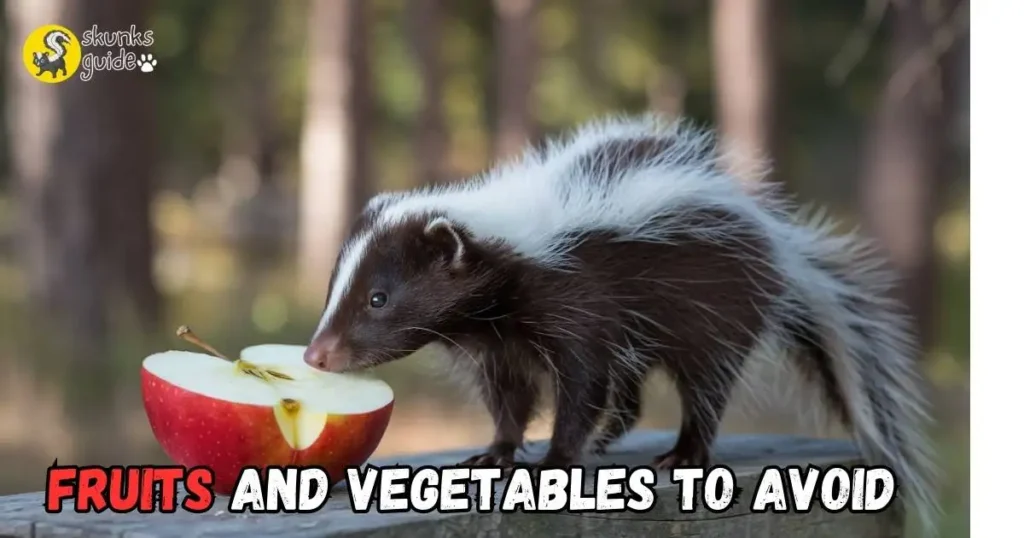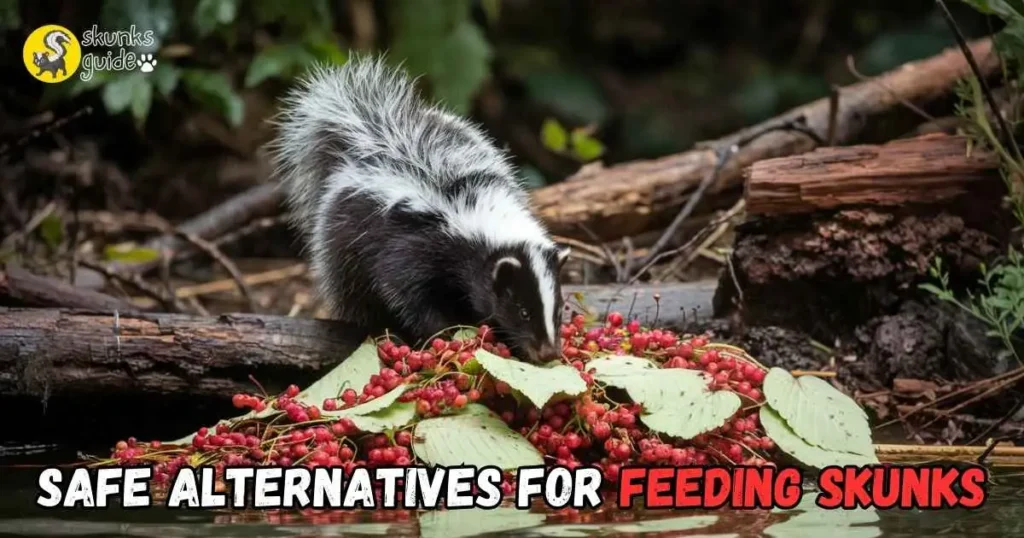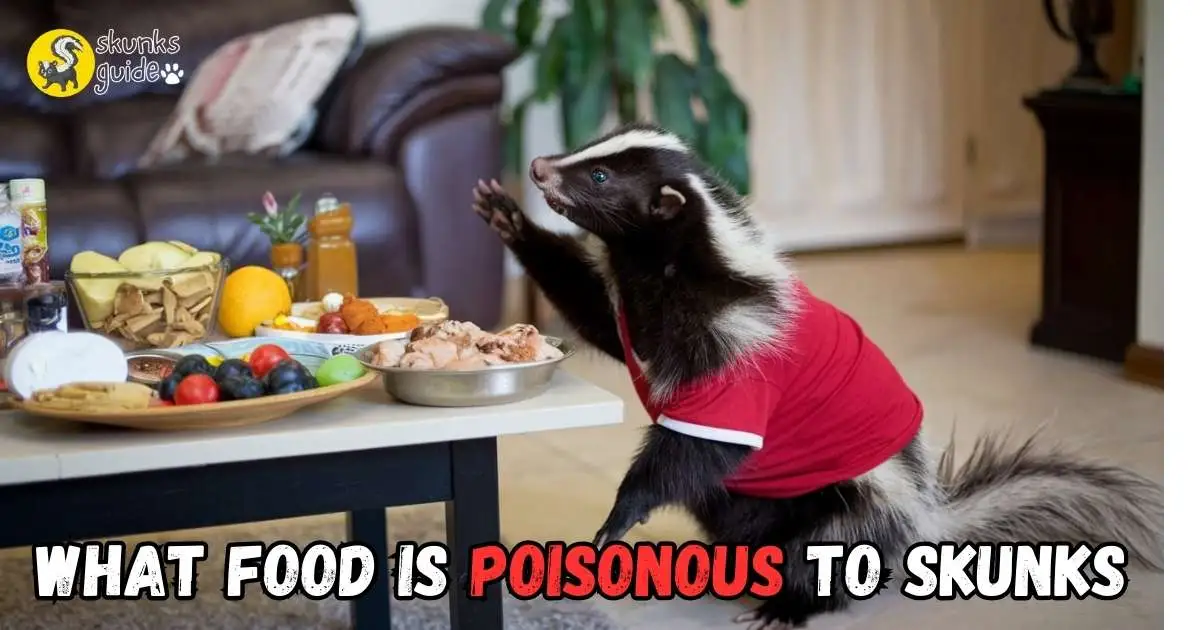What Food Is Poisonous To Skunks
Skunks are a common sight in many neighborhoods with their black and white stripes. They are fascinating to watch, but it’s important to know what they can eat safely. This article will cover the toxic foods skunks should avoid, keeping them safe and healthy.
Many foods, from household items to fruits and veggies, can harm skunks. Learning about their dietary needs and what’s toxic helps protect them. Whether you’re worried about your skunk or just curious, this guide will help you understand what to avoid feeding them.
Understanding Skunk Dietary Needs
Skunks are fascinating creatures that many pet owners find intriguing. As omnivores, they eat both plants and animals. Knowing what they need to eat is key for their health and happiness.
Skunks as Omnivores
Skunks are adaptable eaters, eating a wide range of foods. Their diet includes insects, small rodents, eggs, berries, fruits, and plants. This helps them thrive in different environments, from cities to the countryside.
Importance of a Balanced Diet
It’s vital to give skunks a balanced skunk nutrition plan. A diet full of proteins, fats, carbs, vitamins, and minerals is essential. It helps them grow, stay energetic, and stay healthy. Not meeting their skunk feeding habits can cause health problems.
| Nutrient | Importance for Skunks |
|---|---|
| Proteins | Support muscle development and repair. |
| Fats | Provide energy and aid in the absorption of fat-soluble vitamins. |
| Carbohydrates | Serve as a primary energy source for the body. |
| Vitamins and Minerals | Promote overall health, immune function, and bone development. |
By understanding skunks’ dietary needs and feeding them well, pet owners can keep them healthy and happy for a long time.
Common Household Foods Toxic to Skunks
Skunks are curious, but many household foods are harmful to them. As pet owners or wildlife fans, knowing which foods are toxic is key. We must keep these foods away from skunks.
Chocolate is very dangerous for skunks, just like it is for dogs. Skunks can’t break down the theobromine in chocolate. This can cause stomach problems, seizures, and even death. Onions and garlic are also toxic. They can harm a skunk’s red blood cells.
| Toxic Household Items for Skunks | Potential Consequences |
|---|---|
| Chocolate | Gastrointestinal issues, seizures, death |
| Onions and Garlic | Damage to red blood cells |
| Alcohol | Neurological and respiratory problems, coma, death |
| Caffeine | Restlessness, rapid breathing, heart palpitations, seizures |
| Cleaning Products | Irritation, burns, organ damage |
Drinks with alcohol and caffeine are also harmful. They can cause serious health issues, coma, and death. Cleaning products can irritate, burn, and damage organs if skunks touch or eat them.
To keep skunks safe, store harmful items securely. Knowing the risks helps us protect these amazing animals. Let’s make sure they stay safe from toxic foods and items.
Fruits and Vegetables to Avoid

Feeding skunks requires careful attention to what fruits and vegetables are safe. Many common items can harm these animals. It’s important to know which ones to avoid.
Toxic Fruits for Skunks
Skunks should not eat certain fruits because they can be dangerous. Here are some fruits to avoid:
- Grapes and raisins
- Citrus fruits (such as oranges, lemons, and limes)
- Avocados
- Apples (in large quantities)
These fruits can cause serious health issues in skunks. It’s best to keep them away from these foods.
Dangerous Vegetables for Skunks
Some vegetables are also toxic to skunks. Here are a few to avoid:
- Onions
- Garlic
- Chives
- Tomatoes (in large quantities)
These vegetables can harm skunks’ health. Always check the safety of fruits and vegetables before giving them to skunks.
Harmful Meats and Proteins
Skunks are omnivores, eating both plants and animals. But not all meats and proteins are safe for them. The wrong foods can cause serious health problems or even death. It’s important to know what skunks need to stay healthy.
Some meats and proteins to avoid for skunks include:
- Chicken and other poultry – Skunks can’t digest chicken’s high protein well. This can lead to stomach problems and organ failure.
- Pork – Skunks also have trouble with pork. It can cause health issues in these animals.
- Beef – Beef is not good for skunks. It’s hard for their digestive system to handle, leading to complications.
It’s also best to avoid processed, high-fat, or seasoned proteins. These can harm a skunk’s health. A skunk diet should include natural, whole foods for their skunk nutrition.
“Feeding skunks the wrong types of meat and protein can lead to serious health issues and even prove fatal.”
Knowing which meats are poisonous to skunks helps pet owners give them a safe, nutritious diet. This supports their unique dietary needs.
what food is poisonous to skunks
Identifying Toxic Ingredients
Feeding skunks requires knowing what foods are toxic to them. Skunks are omnivores with specific dietary needs. It’s important to identify harmful foods to keep them healthy.
Vitamins and minerals can be harmful if skunks eat too much of them. For example, vitamin A toxicity can happen from eating too much liver or fish oil. Also, iron poisoning can occur from eating too much iron-rich foods.
- Onions and garlic are toxic ingredients for skunks. They can cause stomach problems and anemia.
- Xylitol, a sugar substitute, is poisonous to skunks. It can lower blood sugar levels dangerously.
- Avocado pits and skin have persin, which is toxic to skunks. It can cause vomiting, diarrhea, and heart issues.
Knowing what foods are toxic to skunks helps keep them healthy. Skunk owners must provide a balanced diet without these hazards.
Dangers of Feeding Skunks Table Scraps
It might seem nice to give leftover food to skunks. But, it’s very dangerous for them. Skunks need different food than humans, and the wrong food can harm them a lot.
Risks of Processed Foods
Processed foods are bad for skunks. They have too much salt, sugar, and preservatives. These can upset their stomachs, make them dehydrated, and even hurt their organs.
Processed meats like hot dogs or deli meats are also bad. They have spices and seasonings that can harm skunks.
It’s better to give skunks food that’s good for them. They should eat fresh, whole foods. This includes:
- Fresh fruits and vegetables
- Lean proteins like cooked eggs or unseasoned chicken
- Nuts and seeds
Knowing the dangers of feeding skunks table scraps and the risks of feeding skunks processed foods helps keep them healthy. This way, they can live well in their natural homes.
Safe Alternatives for Feeding Skunks
Many foods are bad for skunks, but there are safe options too. Knowing what skunks need and giving them the right food is key. This way, you help these animals stay healthy and happy.

Recommended Skunk-friendly Foods
Skunks like to eat a variety of foods. Here are some good choices:
- Fresh fruits such as bananas, berries, and melon
- Crunchy vegetables like carrots, sweet potatoes, and leafy greens
- Cooked grains like brown rice, quinoa, and oatmeal
- Lean proteins such as boiled eggs, unsalted nuts, and cooked chicken or fish
- Clean, fresh water
Don’t give skunks processed foods or things with a lot of sugar or salt. These can hurt them. Stick to natural foods to keep them healthy and happy.
| Safe Foods for Skunks | Unsafe Foods for Skunks |
|---|---|
| Fruits: Bananas, berries, melon | Fruits: Citrus, grapes, raisins |
| Vegetables: Carrots, sweet potatoes, leafy greens | Vegetables: Onions, garlic, potatoes |
| Proteins: Boiled eggs, unsalted nuts, cooked chicken/fish | Proteins: Raw meat, fatty or processed foods |
| Grains: Brown rice, quinoa, oatmeal | Grains: Sugary cereals, bread, crackers |
By giving skunks a balanced diet, you help them stay healthy. Avoid bad foods and choose natural, nutritious ones. This meets their special needs.
Signs of Poisoning and What to Do
It’s important to know the signs of skunk poisoning to act fast. Symptoms include vomiting, diarrhea, feeling very tired, shaking, or seizures. If you think a skunk ate something bad, don’t touch it and call a wildlife center or vet right away.
Acting quickly is key when a skunk is poisoned. Don’t try to make it vomit or give it medicine. This could make things worse. Keep the skunk in a safe, quiet spot and watch it until help comes.
Experts at wildlife centers or vets know how to help. They might give special treatments or care to help the skunk get better. Working with them can help the skunk recover and stay safe.

